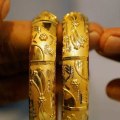Some types of money, such as coins, paper money and precious metals, are subject to sales tax in many states. In some states, sales of all types of money are exempt. The Internal Revenue Service (IRS) considers physical holds of precious metals such as gold, silver, platinum, palladium and titanium to be capital assets specifically classified as collectibles. Holdings in these metals, regardless of their shape, such as bullion coins, ingots, rare coins or ingots, are subject to capital gains tax.
For those interested in investing in gold, a Gold Investing Guide can provide helpful information on the tax implications of gold investments. Capital gains tax is only due after the sale of such shares and if the shares were held for more than one year. This is the case not only for gold coins and ingots, but also for most ETFs (exchange-traded funds), which are taxed at a 28% tax. Many investors, including financial advisors, have trouble owning these investments. They assume, incorrectly, that since the gold ETF is traded like a stock, it will also be taxed as a stock, which is subject to a long-term capital gains rate of 15 or 20%.
Investors often perceive the high costs of owning gold as profit margins and storage fees for physical gold, or management fees and trading costs of gold funds. In reality, taxes can represent a significant cost of owning gold and other precious metals. Fortunately, there is a relatively easy way to minimize the tax implications of owning gold and other precious metals. Individual Sprott Physical Bullion Trusts investors may offer more favorable tax treatment than comparable ETFs.
Since trusts are headquartered in Canada and are classified as passive foreign investment companies (PFIC), non-corporate U.S. investors can opt for standard long-term capital gains rates by selling or repaying their units. Again, these rates are 15% or 20%, depending on revenue, for units held for more than one year at the time of sale. While no investor likes to fill out additional tax forms, the tax savings of owning gold through one of Sprott's physical ingot trusts and participating in annual elections can be worthwhile.
For more information on Sprott physical ingot trusts, ask your financial advisor or Sprott representative for more information. Royal Bank Plaza, South Tower 200 Bay Street Suite 2600 Toronto, Ontario M5J 2J1 Canada. Gross revenue from the sale of precious metal ingots (gold ingots, processed nuggets, etc.) This applies even if ingots are sold for a higher than nominal value. The prospectus contains important information about trusts, including investment objectives and strategies, purchasing options, applicable management fees, and expenses.
As for precious metals, capital gains occur when a particular coin or ingot increases in value after the initial purchase and is then sold at a higher price. These pieces include, among others, gold coins with fractional denominations; American Eagle gold or silver coins; any foreign currency that was not explicitly mentioned in the IRS's list of reportable items, as well as pieces of U.S. currency that were created after the list was created in the 1980s.



